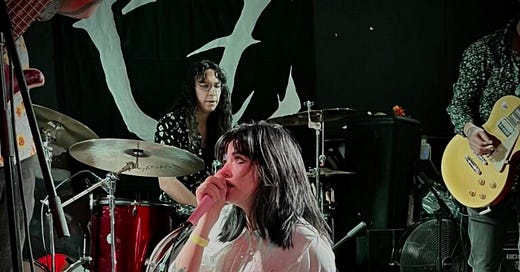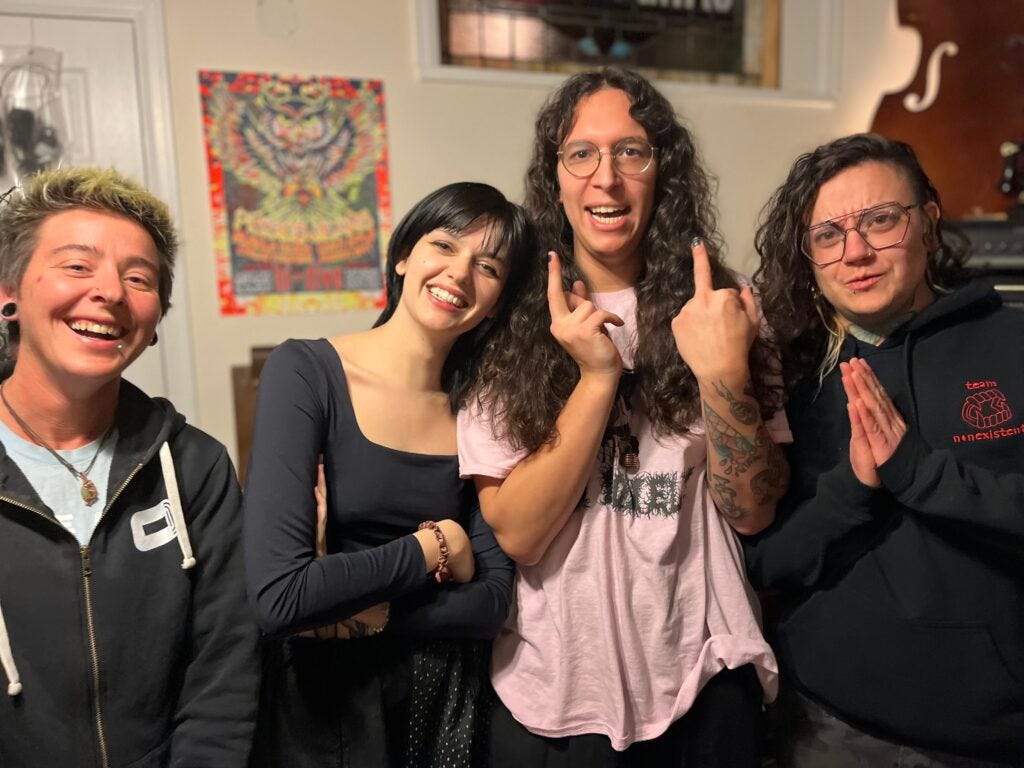Screams & Melodies, Skirts & Kneepads: Team Nonexistent Is What the Scene Was Missing
by Elle Naef
Entering Seventh Circle Music Collective, I’m greeted by a wave of nostalgia—foggy late-night memories of being knocked around the sweaty garage, on the guest list for whatever dude’s band was playing. The drunker I got, the better I was at pretending to like the music.
While Seventh Circle has become a sober, all-ages venue since then, many things about the venue haven’t changed. I make my way through what used to be the living room of the little house-turned-venue until I reach the graffitied ticket booth, sturdy despite years of wear. “Long live DIY,” I tell myself.
In the backyard, I weave by the Seventh Circle street sign into the garage, a small space with a clown car capacity. There are a lot of people here tonight, and, despite attending shows like this countless times before, I forgot what it was like to go alone. I soothe my nerves by playing I Spy, seeing which band names I recognize in the collage of stickers lining the stagefront.
Team Nonexistent was up first. By now, I was fairly well-versed in their music. Their latest album, Teeth, scratched a musical itch I had had for a while now. I craved the angsty vocals, gripping builds, and catchy melodies of music from the 00s, but I’d grown tired of revisiting the problematic lyrics. It’s not the same screaming along to a song when in the back of your mind you know it contributed to your bad taste in men.
Back in 2007, I was a classic MySpace kid, living off caffeine, hair straighteners, and guys in girl pants. After a few visits to the Marquis and grungy basements, I quickly found myself inspired by Denver’s local music scene — the part of the music scene, that is, that was visibly dominated by dudes.
I began booking shows for guys in my high school, starting with the neighbors I smoked pot with every weekend. They called me “Beth the Secretary,” a nickname I would grow to loathe, as it became symbolic of how I’d be viewed in the scene for the next 13 years, regardless of the work I put into my career.
Whether I was booking sold-out shows in downtown Denver bars or creating a PR plan for a band, by my mid-20s it was clear that in these circles I would always be viewed as a groupie first and a business asset second. More than once I had received propositions for sex in the same conversations as business deals. Even worse, I spent countless hours comparing notes with other women who also found themselves going to the shows of men who had done the same to them, if not worse.
Given the lyrics of some of the songs in that genre, the misogyny wasn’t surprising. In fact, Denver had some of the classics in this department—3OH!3’s beloved hit “Helen Keller” was about an underage girl trying to get laid at a show. Meanwhile I, an underage girl with only a vague sense of consent, would try to dance the cringe away.
Other themes in these circles somehow objectified and vilified women while victimizing the songwriter, a true “art” in emo culture. The irony was that, locally, the same boys singing these songs were the ones I had witnessed cheating on their supportive girlfriends, or touching me and my friends without consent and feeling justified, even proud if I just rolled with it — a safety and comfort measure it would take me years to identify. And while many would argue that their lyrics were simply metaphors or creative expressions of pain, I can say firsthand that there was an alarming lack of accountability in the culture.
Kicking off the show at Seventh Circle, Team Nonexistent singer Sophia lets out their first wail into a pink microphone, skirt bouncing and purple flower face paint glistening (somehow all while carrying a perfect melody).
Watching Sophia crawl around the floor in kneepads and a skirt, yelling “Hey, if you touch me, I’ll fucking kill you,” —a simple lyric with a clear warning regarding non-consensual touch—I’m choked up with a strange mixture of rage and joy. The words pulse through me as I imagine all the times I’d sung along to lyrics demeaning to women when all that time, this was what I had really wanted to be screaming. I take a deep sigh of relief. I feel a revolution brewing.
Team Nonexistent was born in 2017 in the Pensacola, Florida bedroom of lead singer Sophia LaBelle-Plott. It began as a solo project, but a few years later when he moved to Colorado and played a show at Mutiny Information Café, it began to blossom into much more.
The night of the show, Denver bassist Magic, a longtime Mutiny employee, was running sound.
“As soon as [Sophia] started singing, my jaw dropped. I started looking them up on Instagram like, ‘Who the fuck was that?!’” he remembers.
Soon enough, Magic was showing Sophia his work, and the musical chemistry was clear.
“It was like they were showing me a map to a world I didn’t know existed,” says Sophia. “It was really special.”
The next step was securing a drummer. A mutual friend recommended Billie Christ, a longtime local musician and Hi-Dive employee. Besides being blown away by Christ’s drumming, Sophia and Magic were pleased to find all three of them shared the quirk of playing barefoot at practice.
Lead guitarist Jesse Newman was harder to wrangle. The band had to ask Jesse to join the band twice after being blown away by their solo act Goose. But Jesse’s initial hesitance wasn’t due to lack of desire. “All I’ve ever actually wanted was to play in a band with people, but it just never happened because I was too shy. Getting that second request was critical,” they recall.
Together, the band uncovered a place to truly unmask—both for themselves, and their audience. “In the band, I get to be normal,” says Sophia. “I’ve done like eight years of customer service, which is a lot of masking and people-pleasing. This is for me.”
Since their formation, Team Nonexistent has seen various triumphs, including the October 2024 release of their album Teeth.
Recorded at Band Cave Studios by Collin Ingram, the engineer behind albums by local favorites like Short Shorts, and mastered by Nick Townsend, who has worked on albums by Cheap Trick, Dr. Dre, and Garbage, to name a few, Teeth has the combination of tight musicianship and well-produced tracks that make the album a delectable listen.
While the mix alone was enough to perk up my ears, those lyrics are what will keep me a loyal fan. I now have the pleasure of replacing phrases from my old Seventh Circle days, like “You’re nothing more than a typical whore” with “Feminine identity, it’s always endangered me. Why don’t I let it endanger someone else?” and each time I feel my inner teen moshing with joy.
According to Jesse, Team Nonexistent doesn’t consider themselves a blatantly political band, but the inherently politicized elements aren’t lost on them.
“We live in a political world. All these parts of our identity, whether that’s gender, sexuality, race, ethnicity, or neurodivergence are all political things, impacted by political views,” they tell me.
Magic notes that while they’re impacted by politics, they also recognize the privilege they have in playing with a band like Team Nonexistent. “Being a trans band and being so public and vocal about our identities is not even really that scary to me, personally. It’s a gift to be able to exist in a way that other queer folks, especially in less safe states, can be represented,” he says.
The band relies on trustworthy colleagues to let them know which venues, performers, and organizers are safe to work with, and which ones allow harassment and discrimination, and they maneuver their connections accordingly—for their safety, and the safety of their fans.
Team Nonexistent agree that the Denver music scene has become safer and more inclusive over the years, but note that there’s always room for improvement.
“I do wish there was more accountability,” says Sophia, “But I am happy to hear that there’s less of those things happening lately—more people that share our beliefs and align with a punk scene.”
When it comes to defining their genre, there’s one pet peeve the band shares when it comes to defining their music.
“For a myriad of reasons, I hate when someone call us Riot Grrrl,” says Sophia. “I’m not a girl, we’re all trans, and my music doesn’t even sound like Riot Grrrl,” he says.
So what does Team Nonexistent want to be known as?
“I want to be making music that can be heard by anyone who would need it. To be a source of comfort, or be someone’s queer punk rock band,” Sophia says. “When I was a kid, people didn’t look like me on stage. To see people that look like me, act like me and are like me is really important. I hope that I am like that for someone.”





